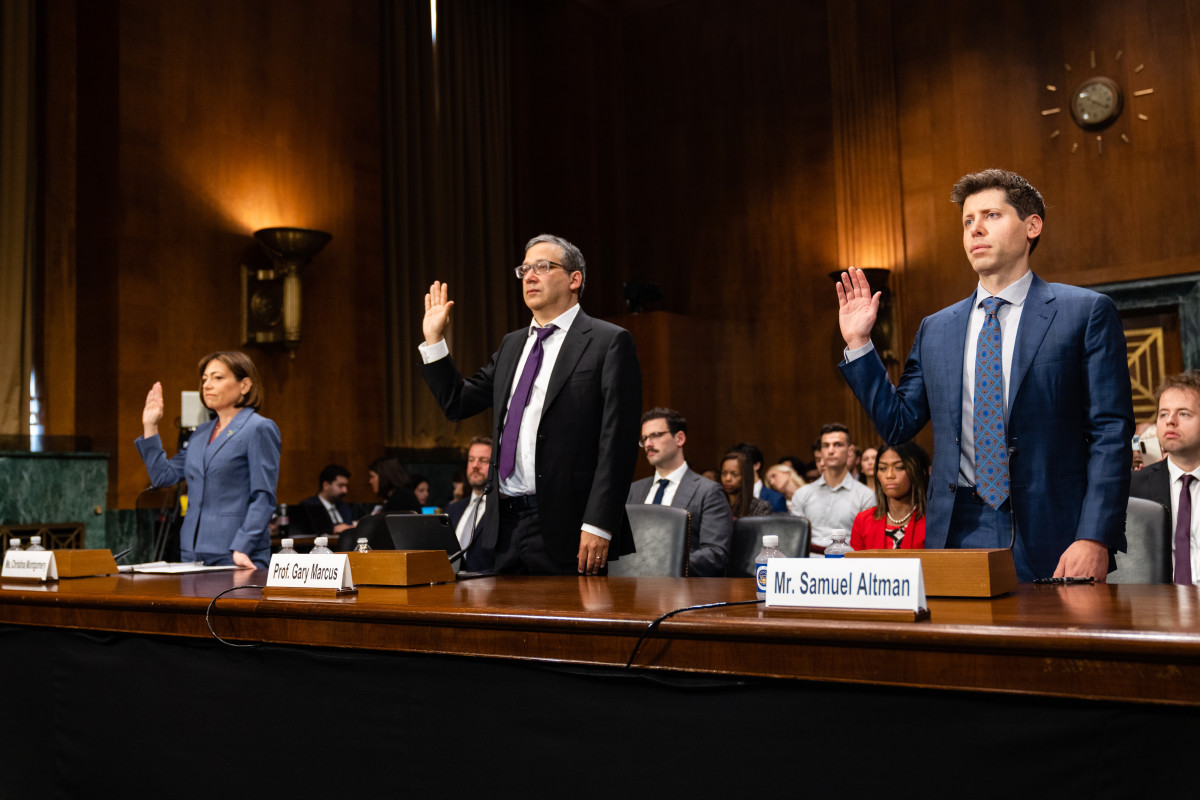
In the year since OpenAI launched ChatGPT, its CEO Sam Altman has regularly called for regulation of the technology, sounding the alarm about the existential, societal threats that advanced artificial intelligence models pose.
Alongside his constant mention of these threats, Altman has defended his company's ongoing decision to attempt to develop an artificial superintelligence by claiming that the benefits far outweigh the risks.
In his mind, some of these benefits include addressing "climate change and curing cancer," something he highlighted at a Senate oversight hearing in May.
Related: Artificial Intelligence is a sustainability nightmare - but it doesn't have to be
But when it comes to the climate, Large Language Models (LLMs) like ChatGPT are not the answer. Such models, according to Dr. Sasha Luccioni, a leading researcher in ethical AI, require a vast amount of computing resources without being particularly climate-positive.
LLMs "are not going to reinvent material science and save the climate," AI expert Gary Marcus told the New York Times in May. "I feel that we are moving into a regime where the biggest benefit is efficiency."
That doesn't mean, however, that AI cannot be applied to mitigate the effects of climate change. Smaller, more precise models with lesser carbon footprints can be applied in certain scenarios to great effect.
IBM (IBM) -) in August open-sourced its geospatial AI model — built in collaboration with NASA — on Hugging Face in an effort to help the planet.
The company on Wednesday unveiled a series of efforts and partnerships it has undertaken in service to that mission.
"AI foundation models utilizing geospatial data can be a game-changer because they allow us to better understand, prepare and address the many climate-related events affecting the health of our planet in a manner and speed never before seen," IBM Fellow and Vice President of accelerated discovery Alessandro Curioni said in a statement.
One of these such efforts revolves around a collaboration between the company and the Mohamed Bin Zayed University of Artificial Intelligence; scientists, using IBM's geospatial model, are attempting to map urban heat islands to mitigate their impact.
Urban heat islands refer to areas with significantly higher temperatures than their surrounding locations; in this specific effort, the teams are applying IBM's model to understand the environment in Abu Dhabi and how it relates to the surrounding area.
IBM said in a statement that, thus far, the effort has succeeded in reducing the effects of the heat island by more than 5.4 degrees Fahrenheit.
The company also partnered with the Kenyan government to support its reforestation plans which involve planting 15 billion trees across the country by 2032. The reforestation campaign is working with IBM's geospatial model to aid in the tracking and visualization of tree planting and tree growing, something IBM said will help mobilize efforts on the ground.
The tech firm has additionally partnered with Royal HaskoningDHV, a consulting engineering company, in its establishment of a new service — taking advantage of IBM's geospatial model — that will "automate and scale" climate risk assessment for organizations across the United Kingdom.
The first instance of this program will focus on analyzing the short-term impact of extreme weather on aviation operations, and the long-term impact of climate change on future airport operations and infrastructure.
IBM is also working with a number of other sectors across the U.K. to enhance the country's climate resiliency, one of which involves the geospatial mapping of urban areas to identify where trees can be planted to reduce the risk of flooding.
"We have been able to observe how trees contribute to reducing surface water flooding risks across the city under different scenarios, using" this model, Chloe Treger, the lead of TreesAI U.K., said in a statement. "This has enabled us and our partners to make the business case for tree planting and maintenance."
Related: IBM exec explains the difference between it and prominent AI competitors
The impact of geospatial models
IBM's geospatial model, which was trained for a year on U.S. data, can be repurposed for a number of climate-positive efforts, including tracking deforestation and greenhouse gas emissions, the company said in August.
Such models, while not unique to IBM, provide an important tool in addressing climate change, according to Konstantin Klemmer, a geospatial machine learning researcher and member of Climate Change AI, a global NGO working at the intersection of climate change and AI.
"We are capturing more and more geospatial data, and machine learning offers a fantastic toolbox to find patterns in this unstructured data," he told TheStreet.
IBM told TheStreet that its geospatial model has 100 million parameters, a fraction of ChatGPT's 175 billion parameters.
Still, Klemmer said that geospatial models deal with much larger data than the text data inherent to LLMs, something that makes their training a potentially costly process.
"Existing geospatial foundation models have only scratched the surface on processing this data," he said. "This also has implications for the training cost of these models: Large-scale geospatial foundation models are potentially very expensive to train and may produce substantial amounts of CO2 emissions."
The numerical supercomputer simulations that such models are replacing, he said, however, are "not much cleaner."
The promise of geospatial models, Klemmer said, is that, despite the cost of their training, they are much cheaper when it comes to making forecasts. Getting them up to par with the current simulators, he said, however, is still a "big challenge."
"So there emerges a kind of tradeoff: existing numerical simulators that are slower and more expensive but more accurate, versus geospatial foundation models that might be faster, less expensive (especially when doing predictions) but less accurate," Klemmer said.
Contact Ian with tips via email, ian.krietzberg@thearenagroup.net, or Signal 732-804-1223.
Related: The ethics of artificial intelligence: A path toward responsible AI
Get exclusive access to portfolio managers’ stock picks and proven investing strategies with Real Money Pro. Get started now.







